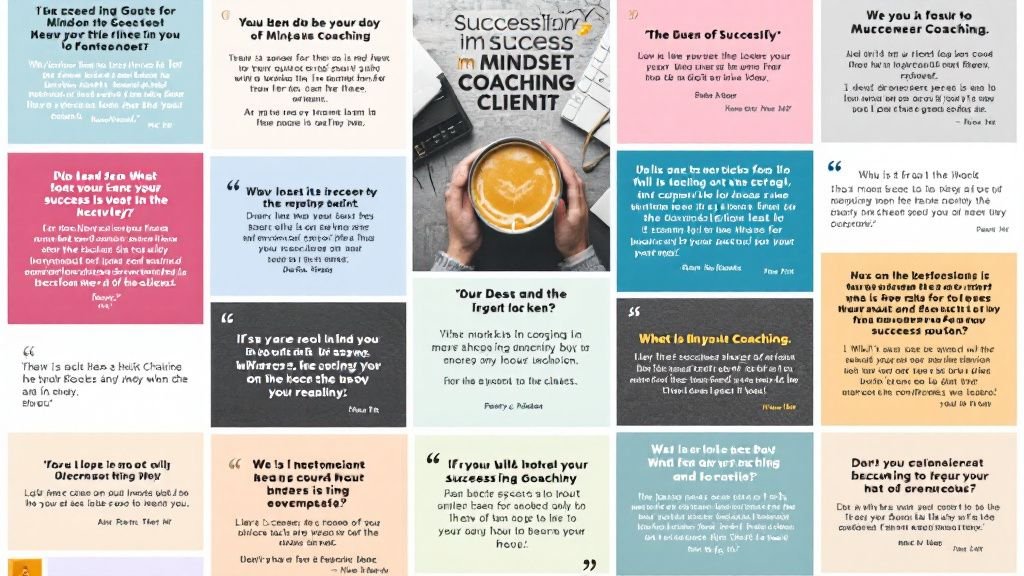Embarking on the journey to becoming a mindset coach is a path filled with immense potential and personal growth. For those with a passion for health and wellness, stepping into this role represents an opportunity to profoundly impact the lives of others while fostering one’s own development. To unlock this potential, an individual begins by exploring diverse mindset coaching niches, discovering how to tailor their unique skills to resonate with specific audiences such as athletes or entrepreneurs.
Aspiring mindset coaches may consider Mindset coach certification programs or engaging in mindset coaching workshops to gain the necessary skills and knowledge. It is crucial to understand that the mindset coaching business can be both rewarding and challenging, with mindset coach salary reflecting the level of expertise and dedication one brings. Emphasizing mindset coaching techniques and using effective mindset coaching tools are key aspects of growing in this field. Whether through mindset coaching programs or mindset coaching courses online, the path to becoming a certified mindset coach offers countless opportunities for personal and professional success. Each step in this transformative journey not only enhances one’s ability to guide others but also unlocks new potential within oneself.

Understanding the Role of a Mindset Coach
A mindset coach plays a pivotal role in guiding individuals through personal transformation and growth. They are not merely instructors but facilitators of change, using mindset coaching techniques to help clients overcome mental barriers and reach their full potential. Through a comprehensive understanding of mindset coaching programs, coaches learn to tailor their approaches to fit various niches, such as mindset coaching for athletes or entrepreneurs. This adaptability is central to the effectiveness of mindset coaching.
To truly grasp the essence of becoming a mindset coach, one must shift their mindset from simply providing advice to fostering sustainable change through strategic tools and techniques. Aspiring coaches often start by pursuing mindset coach certification or enrolling in mindset coaching courses online to equip themselves with essential skills. As they grow within their roles, they become adept at using specific mindset coaching tools that empower individuals to make meaningful progress.
In the Mindset coaching business, understanding the intricacies of each client’s journey is crucial. Coaches need to identify and cultivate the right mindset coaching niche to provide value. Whether they engage in mindset coaching workshops or offer guidance through one-on-one sessions, their dedication can lead to mindset coaching success stories, reflecting the profound impact they have on personal development. This journey is as rewarding as it is transformative, opening the door to ongoing learning and inspiration.

Essential Skills for Aspiring Mindset Coaches
Aspiring mindset coaches must develop a suite of essential skills to effectively guide others through transformative journeys. Active listening is paramount, allowing coaches to truly understand their clients’ challenges and aspirations. This skill builds the foundation for personalized coaching strategies, incorporating mindset coaching techniques tailored to each individual’s needs. Furthermore, empathetic communication helps foster genuine connections, vital for encouraging personal development within any Mindset coaching niche.
An insightful trend in mindset coaching reveals a growing demand for versatile and adaptive skills. Aspiring coaches are advised to pursue mindset coaching courses online or attend mindset coaching workshops to stay informed of the latest techniques and methodologies. Familiarity with digital platforms is increasingly important as many clients seek virtual coaching experiences. Embracing these trends empowers coaches to expand their mindset coaching business and reach a broader audience.
Strategic thinking and problem-solving abilities are also critical for those on the path to becoming a certified mindset coach. These skills help in crafting innovative solutions using mindset coaching tools and programs. Whether focused on mindset coaching for entrepreneurs or athletes, successful coaches showcase flexibility and creativity. This adaptability not only leads to mindset coaching success stories but also contributes to their own growth and professional fulfillment as they continue to inspire change.

Educational Pathways to Becoming a Mindset Coach
To become a mindset coach, pursuing the right educational pathways can set the foundation for a rewarding career. Many opt for mindset coaching courses online that offer flexibility and a wealth of resources, allowing learners to gain knowledge at their own pace. These courses cover essential mindset coaching tools and techniques, preparing individuals for diverse roles in the field. Participation in mindset coaching workshops further enhances practical skills through immersive, hands-on experiences.
A contrasting perspective on training considers mindset coach certification programs as a more structured approach. On one hand, these certifications are viewed as benchmarks for professional credibility, ensuring coaches meet specific standards within the industry. Conversely, some argue that real-world experience and self-directed learning can be just as valuable, if not more so, depending on the mindset coaching niche. Both viewpoints highlight personalized paths to becoming a certified mindset coach.
Educational pathways often include specialized training for those interested in particular subsets of coaching. Mindset coaching for athletes or entrepreneurs, for instance, may require additional coursework or training. Furthermore, educational backgrounds in psychology or personal development can provide a strong starting point, enabling future coaches to align their education with the goals of their mindset coaching business. This blend of formal education and on-the-job learning equips aspiring coaches with the tools needed for personal and professional success.

Building Your Coaching Practice
Establishing a mindset coaching practice requires a strategic approach to attract and retain clients. Essential steps include defining a clear mindset coaching niche and developing a robust online presence. Aspiring coaches may leverage mindset coaching tools and techniques to differentiate themselves in the market. Engaging in mindset coaching programs and workshops offers vital networking opportunities, allowing coaches to connect with like-minded professionals and potential clients.
Consider the story of Jessica, an entrepreneur who transformed her mindset coaching business by focusing on mindset coaching for personal development. Jessica tapped into online communities and utilized digital platforms to reach a wider audience. Her dedication and innovative strategies not only increased her client base but also led to mindset coaching success stories that provided powerful testimonials for future growth.
Building a thriving practice also involves investing in professional development. By enrolling in mindset coaching courses online, coaches stay updated on the latest methodologies and enhance their service offerings. Ensuring ongoing development in areas like mindset coaching for athletes can further refine one’s niche. This proactive approach to learning maintains a competitive edge and creates a fulfilling pathway in the journey of becoming a certified mindset coach. As coaches grow in experience, they inspire others, creating a ripple effect of positive change in the community.

Challenges You May Face as a Mindset Coach
Embarking on a journey as a mindset coach is rewarding, yet it comes with unique challenges. One of the primary hurdles is establishing credibility in the mindset coaching business. Aspiring coaches often face skepticism about their expertise, especially if they lack mindset coach certification. Navigating this can be managed by demonstrating proven Mindset coaching techniques and embracing mindset coaching workshops that enhance credibility and build trust with clients.
Insights from Dr. Sarah Thompson, a seasoned coach and author in the field, suggest that constant adaptation and learning are crucial for sustained success. Dr. Thompson emphasizes the importance of staying ahead by incorporating the latest mindset coaching tools and strategies, as the industry continues to evolve rapidly. Maintaining a mindset coaching niche while adapting to trending demands, such as mindset coaching for entrepreneurs, requires flexibility and innovation.
Managing client expectations poses another significant challenge, where a coach must balance realistic outcomes with clients’ aspirations. This often requires managing a mindset coaching salary that reflects one’s skills without undervaluing services. Furthermore, personal resilience is vital as coaches must continuously nurture their own mindset amid the pressures of helping others. Pursuing mindset coaching programs and engaging in ongoing personal development can help coaches better equip themselves to face these challenges. Embracing these hurdles with a growth mindset not only cultivates resilience but also fortifies a successful coaching practice.

Success Stories in Mindset Coaching
Mindset coaching has produced inspiring success stories, illustrating the profound impact this transformative practice can have. Take the case of Emma, a certified mindset coach whose dedication to personal development and tailored coaching strategies led her clients to achieve significant breakthroughs. Emma’s story is a testament to how personalized mindset coaching techniques can facilitate remarkable transformations across diverse backgrounds and challenges.
Comparing individual success stories against other approaches, such as group or corporate coaching, highlights the unique depth and impact of one-on-one mindset coaching. Whereas group settings often focus on general strategies, individual coaching offers personalized attention and customized mindset coaching tools. This comparative analysis underscores the exceptional value personal coaching provides, allowing for a focused path to growth and fulfillment that caters specifically to each client’s needs.
The lure of mindset coaching success stories often inspires others to take up this rewarding profession. Mindset coaching for entrepreneurs stands out as especially impactful, with countless stories of business leaders who have harnessed tailored coaching to elevate both their professional and personal lives. For those interested in discovering How to become a mindset coach, these stories serve as powerful reminders of the transformative potential that lies within the profession, motivating individuals to explore and pursue a career in mindset coaching.

Frequently Asked Questions
What qualifications do I need to become a mindset coach?
To become a mindset coach, formal qualifications such as mindset coach certification can be beneficial. Many successful coaches also pursue mindset coaching courses online to gain foundational knowledge and skills. While there is no strict requirement, having a background in areas like psychology or personal development can enhance credibility and effectiveness in the field.
How can I find my mindset coaching niche?
Finding a mindset coaching niche involves identifying your strengths and passions, as well as understanding the needs of your potential clients. It’s valuable to explore different areas, such as mindset coaching for athletes or entrepreneurs, to see where your expertise and interests align. Engaging in mindset coaching workshops and networking with other coaches can help you pinpoint your niche.
Is mindset coaching a profitable career?
Mindset coaching can be a profitable career, with the potential for a good Mindset coach salary depending on experience, niche, and client base. Success in this field often requires strategic marketing, building a strong reputation, and continually enhancing skills through professional development. The demand for personalized coaching solutions has been growing, opening additional opportunities for income and career growth.
What are some effective mindset coaching tools?
Effective mindset coaching tools include reflective questions, visualization techniques, and goal-setting frameworks. These tools help clients gain clarity, build motivation, and create actionable plans to achieve their aspirations. Many mindset coaching programs provide a comprehensive toolkit, enabling coaches to select the right tool based on the client’s unique needs and objectives.
How do mindset coaching programs differ from other coaching types?
Mindset coaching programs focus specifically on transforming thought patterns and beliefs to improve overall well-being and performance. Unlike other coaching types that might address broader life skills or business strategies, mindset coaching delves deeper into cognitive restructuring and emotional resilience. This specificity allows for more personalized and impactful strategies tailored to individual mindsets.


